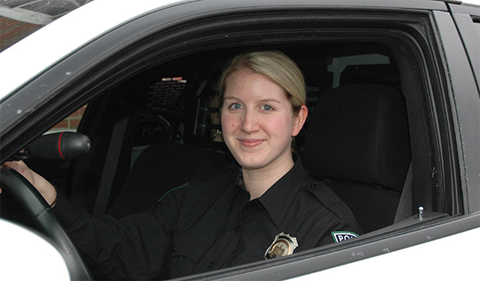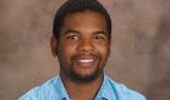
Natasha Lorenz joined OUPD after graduating from OHIO with a bachelor’s degree in criminology and sociology in May 2014.
By Amber Damiani ’15
Three recent Sociology-Criminology graduates returned to campus in March to talk to current students about applying for internships and entering the job market.
At the Sociology Alumni Panel on March 13, two one-hour panels featured Bobcat Alumni who graduated with degrees in Sociology, Sociology-Criminology, or Sociology Pre-Law sharing their stories and experiences. See the second panel on “Sociology Alumni Find Their Passions in Business, Non-Profits, Education.”
Sociology Criminology Career Pathways in Criminal Justice
The first panel consisted of alumni who graduated with degrees in Sociology-Criminology who now have occupations in the criminal justice field: Jen Atkins ’13, Natasha Lorenz ’14, and Ryan Womack ’12.
Atkins, a deputy with the Athens County Sheriff’s Office, shared that when she began at Ohio University, she never in a million years imagined she would become a police officer. By the end of her senior year at Ohio University, she had completed the academy, taking night classes in addition to her college classes during the day. Once she graduated, she started her full-time position as an officer the day after commencement.
“Never discount any opportunity put in front of you because it could be the path you never thought of that ends up being the right one for you,” Atkins says. She said she loves her job as a police officer and the next step for her career would be to become a detective.
‘Talk to As Many People As You Can’
As the youngest of the panelists and newest to her career, Lorenz, a police officer with the Ohio University Police Department, stressed the importance of meeting people and getting your name out there.
“Get out there, talk to as many people as you can, go on Ride-Alongs. You can never have enough information and you can never know enough people,” said Lorenz, who shared that she knew she wanted to work for OUPD because she didn’t want to leave Athens. And she knew she wanted to be police officer. She began reaching out to other OUPD Officers early on, and when the time came for her to apply, everyone already knew who she was and liked her. Her long-term career goals are to continue her education and eventually teach.
Lorenz’ best piece of advice to current students is to get as much experience as possible because she can say firsthand—as a “newbie” on the job—that every single day is a learning experience, and the biggest struggle of the job is taking the knowledge and skill set you have gained and applying it to split-second decisions you have to make in the real world.
Applying Knowledge of Group Dynamics and Social Problems
Womack is a community reentry specialist with the Ohio Department of Rehabilitation and Corrections Halfway House – Alvis House. He began his career path with an internship at the Hocking Valley Community Residential Center in Nelsonville, OH, while he was still attending Ohio University. He now works in a halfway house with clients who have been released from prison. The next step for his career is to become a parole officer.
“If you have an idea what you want to do, start looking now,” he says. “Start making contacts and looking for internships because the experience you gain from those jobs will really tell you if you’re taking steps in the right direction or if it’s not the right fit for you.”
The panelists agreed that the education they received at Ohio University continues to help then tremendously in terms of deescalating situations and negotiating with people, especially the knowledge gained about group dynamics, social problems, and social interaction.
Womack stated that in this profession is it imperative to be “open-minded and understand there will always be those people and situations you aren’t prepared for, so empathy and interpersonal skills are key because it helps your objectivity of the situation and how you respond to others in that moment.”
The panelists offered to continue providing information and mentoring the students. Atkins and Lorenz offered to help students interested in going on a Ride-Along and seeing what a normal shift for an officer is like. Womack shared that Alvis House and other agencies provide internships and volunteer experiences that students can find on their websites. Students interested in contacting the panelists should contact Dr. Thomas Vander Ven, Professor of Sociology.




















Comments